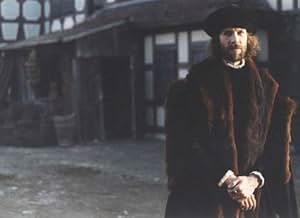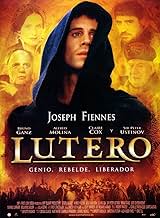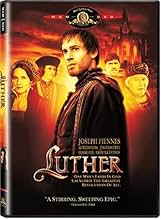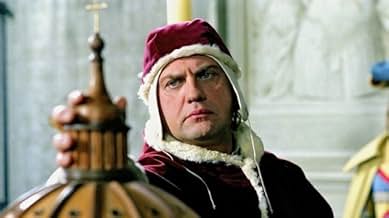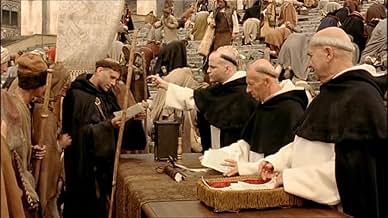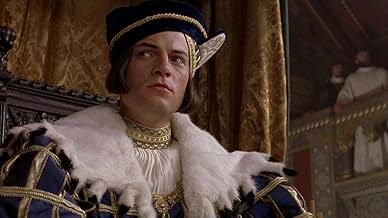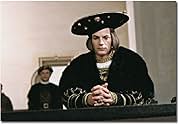During the early sixteenth century, idealistic German monk Martin Luther, disgusted by the materialism in the Catholic Church, begins the dialogue that will lead to the Protestant Reformatio... Read allDuring the early sixteenth century, idealistic German monk Martin Luther, disgusted by the materialism in the Catholic Church, begins the dialogue that will lead to the Protestant Reformation.During the early sixteenth century, idealistic German monk Martin Luther, disgusted by the materialism in the Catholic Church, begins the dialogue that will lead to the Protestant Reformation.
- Awards
- 4 wins & 1 nomination
- Frederick the Wise
- (as Sir Peter Ustinov)
- Director
- Writers
- All cast & crew
- Production, box office & more at IMDbPro
Storyline
Did you know
- TriviaThis was Peter Ustinov's final theatrical film before his death on March 28, 2004 at the age of 82.
- GoofsIn the movie Luther quotes the Bible by chapter, and verse. Versification of the Scriptures was not added until five years after Luther's death in 1546. The French scholar-printer Estienne introduced verse numbering and divisions in his Greek-Latin New Testament in 1551. In 1552 he printed a French-Latin New Testament, also with the verse divisions. And in 1553 he printed a French translation of the Bible with verse divisions throughout. Within the same decade the system of verse divisions spread widely, influenced by the adoption of this system in the Geneva Bibles.
- Quotes
Martin Luther: Unless I am convinced by Scripture and by plain reason and not by Popes and councils who have so often contradicted themselves, my conscience is captive to the word of God. To go against conscience is neither right nor safe. I cannot and I will not recant. Here I stand. I can do no other. God help me.
- ConnectionsVersion of Martin Luther (1953)
Knowing the film world, I doubt this film was made to glorify God. It probably was made more to make the Roman Catholic church look bad, or to glorify a rebel and a man of the people: "the peoples' liberation" as the back cover of the DVD states.
Whatever the motive, it stays true to history and it's nice to see that for a change. To those unfamiliar with Luther, he was the founder of the Protestant denomination. Luther was monk who saw and heard things he thought were unscriptural and broke off from the Catholic Church in "protest." Hence, the "Protestant" church was formed.
Anyway, not only was the story done well, so was the cinematography. This is one gorgeous movie to ogle, well-filmed with high production values. The scenery, sets and costumes are all first-rate.
Joseph Fiennes (Luther) is a bit wimpy-looking but his character certainly isn't. As the subject of indulgences and other practices begin to transform Luther's ideas of what Jesus' church should be, the story grows in intensity as Luther gets pressured by the Catholic hierarchy as his protest issues become public.
What happens to him and to the masses because of his actions are revealed in pretty dramatic form. Obviously the story is far more complex than two hours can give it but the filmmakers did a pretty good job condensing it to make the time constriction.
Notes: This was Peter Ustinov's last movie. On the DVD, being that is was a fairly expensive one, I am surprised there were no "extras." In all, however, a solid film but it will definitely offend Roman Catholics.
- ccthemovieman-1
- Jan 12, 2006
- Permalink
- How long is Luther?Powered by Alexa
Details
- Release date
- Countries of origin
- Languages
- Also known as
- Luter
- Filming locations
- Coburg, Bavaria, Germany(Veste Coburg, castle)
- Production companies
- See more company credits at IMDbPro
Box office
- Budget
- $30,000,000 (estimated)
- Gross US & Canada
- $5,791,328
- Opening weekend US & Canada
- $908,446
- Sep 28, 2003
- Gross worldwide
- $29,632,684
- Runtime2 hours 3 minutes
- Color
- Sound mix
- Aspect ratio
- 1.85 : 1
Contribute to this page



